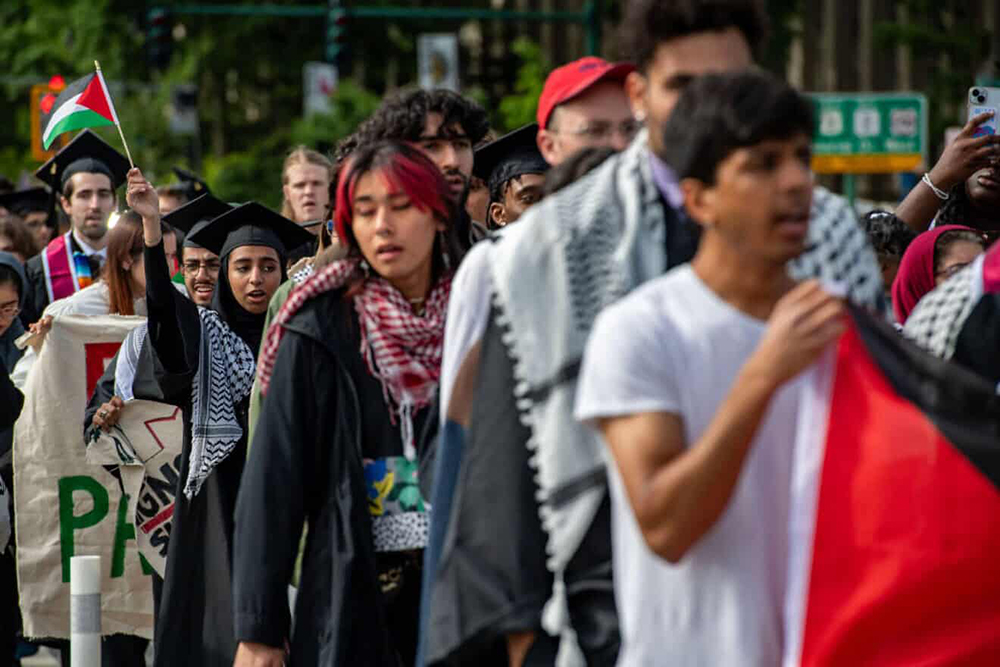|
Getting your Trinity Audio player ready...
|
“Higher education institutions have utterly failed to protect its Jewish students, allowing violent antisemitism to thrive,” says Liora Rez, the executive director of StopAntisemitism.
By: Adi Nirman
A report from StopAntisemitism reveals an unprecedented surge in antisemitic incidents on U.S. college campuses in the wake of the Hamas-led terrorist attacks in southern Israel on Oct. 7, 2023, with Jewish students facing increasing harassment, exclusion and safety concerns.
The organization’s “2024 College Report,” which evaluated 25 higher education institutions, documented a 3,000% increase in antisemitic incidents compared to the previous year, forcing the watchdog group to triple its staff size to handle the flood of submissions.
It paints a troubling picture of campus life for Jewish students with more than half reporting direct experiences of antisemitism at their schools. According to the survey, 55% of Jewish students have been victims of antisemitism, while 43% feel compelled to hide their Jewish identity from classmates out of fear. Some 72% of students reported feeling unwelcome in certain campus spaces simply for being Jewish.
The institutional response to these challenges has been notably inadequate, with only two out of 25 surveyed schools responding to requests for information about their handling of Jew-hatred—down from seven respondents the previous year. The report also found that 67% of Jewish students say they are completely excluded from their school’s DEI initiatives, while 69% report being blamed for the actions of Israel’s government.
Several prestigious universities received failing marks in the report’s grading system.
The Massachusetts Institute of Technology saw its grade drop from a C to an F following incidents that included a three-week pro-Palestinian encampment where participants called for violence against Jewish students. The evaluation considered several criteria: protection measures, allyship initiatives, identity support and policy implementation.
“These higher education institutions have utterly failed to protect its Jewish students, allowing harassment, exclusion and violent antisemitism to thrive unchecked,” said Liora Rez, executive director of StopAntisemitism.
“Despite reports of discrimination, death threats and open hostility, the administration has taken little to no meaningful action, abandoning Jewish students in their time of need. This negligence not only endangers Jewish students but also sets a dangerous precedent for intolerance on campus,” she said. “Parents, do not fund this complicity with your tuition dollars. Choose institutions that prioritize the safety and inclusion of all students—Jewish students deserve better.”
StopAntisemitism is proposing a comprehensive reform package for universities, suggesting that they adopt standardized definitions of antisemitism, expand their diversity and inclusion policies to explicitly include Jewish students, and establish clearer protocols for responding to antisemitic incidents from students and faculty.
Some institutions have demonstrated more effective responses to these challenges. Baylor University in Texas and Clemson University in South Carolina received higher grades for their stronger support systems and more proactive responses to antisemitic incidents. However, the overall findings suggest a systemic failure in protecting Jewish students across American higher education.
“Jewish students should not have to consider their own safety when choosing which school to attend,” the report concluded, emphasizing the urgent need for institutional change.
The study found that 43% of current Jewish students would not recommend their school to fellow Jewish students.
(JNS.org)
Originally published by Israel Hayom.




